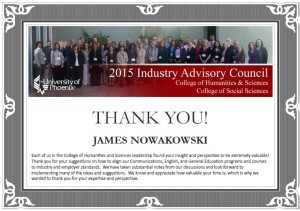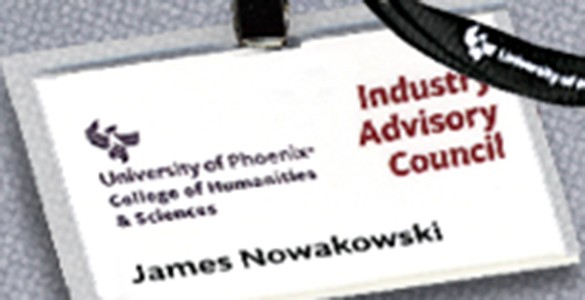“That’s so wrong,” I said speaking up for the first time. “That’s so wrong,” I repeated, emphasis on “so.”
They ignored my comment. I was sitting at a panel discussion regarding the curriculum at University of Phoenix, and we were talking about how their current environment was not friendly for students who want to enroll in the B.A. English program.
Dr. Jessica Philipp, the Program Dean for Humanities, led our group, comprised of myself and 6 other people (mainly academics).
“What do you mean by unfriendly,” someone asked her over my comment?
She said that they have robust enrollments for a university that is not known for liberal arts, but bemoaned management’s reluctance to promote a major in English. They (University management) couldn’t see the payoff in the real world for the English major, she said (i.e., compared to their B.S. in Communication or Certificate in Communication and Technology or Journalism). She added that whenever they had discussions, they had to keep in mind the vision of the University: to be recognized as the most trusted provider of career-relevant higher education for working adults.
“That’s our focus,” she explained, “our guiding principle. Humanities is, therefore, more challenging. The University is more skeptical of the humanities programs we are launching, because the programs are not geared toward a business degree with a clear job path to become an accountant or marketing associate. We have to do a lot more homework to create a convincing offer for these new programs Use that as a frame of reference in our discussions.”
How I Got Invited
I was there to help. I was honored to be invited a couple of months prior to participate on this Industry Advisory Council (IAC) panel held by the University of Phoenix College of Humanities and Sciences on November 13, 2015 in Phoenix, Arizona. Dr. Constance St. Germain, the Executive Dean at the College, said in the welcome, “The IACs serve an important role by providing our colleges’ leadership with valuable perspectives on curriculum, programs, and new developments in the field from a variety of disciplines and professions.”
I was personally  invited by Dr. Amy Smith, the Academic Dean, to provide industry insights to the Advisory Council on Humanities. She wrote to me, “Every year, we bring together leaders from certain industries that align to our existing and future academic programs to discuss industry trends and future needs and insights. For me, I think of it like a day of Industry leaders and futurists discussing and providing insights into their fields.”
invited by Dr. Amy Smith, the Academic Dean, to provide industry insights to the Advisory Council on Humanities. She wrote to me, “Every year, we bring together leaders from certain industries that align to our existing and future academic programs to discuss industry trends and future needs and insights. For me, I think of it like a day of Industry leaders and futurists discussing and providing insights into their fields.”
But somehow, now that I was sitting there, there was a clear disconnect. The instructors who were part of my panel complained about the lack of writing skills of incoming students. And yet, management was saying that the degree in English didn’t lead to a clear path in business. That’s when I said how wrong it was to dismiss the English major. When the opportunity presented itself, I added, “Part of the liberal arts challenge is you can’t structure it like a PR course. As a liberal arts major with two degrees in English, I can tell you it’s irrefutable that you use this knowledge every day. I meet Hamlet many times — the guy who can’t make a decision. And the result is always like the play: tragedy.”
That comment was also ignored when one of the PhD’s there said, “It’s about finding ways to build clear resources to lace in these things, as when we launched career tools, etc.. Pathways, all of those helpful tools, we talked about lacing those somehow into the courses. Is that still on the table as a direction?”
I had no idea what that meant. I listened as people seemed to spew out comments unrelated to what the other person said. It was like you were on a rifle range, and everyone was shooting at their own respective targets with little regard to the shooter next to them.
“If writing is really the gap,” I said after listening to more conversation about lacing, “if people can’t write when they get to the University, what happens before they get here? Have they been taught to write?”
Dr. Philipp looked down, embarrassed, and said, “No.” She proceeded to outline how the school gets new students to take three “prep” courses that help them learn the basics of writing. “We’ve had open enrollment. We’re going to have entrance exams soon. This will help us determine what courses they will need. That’s a direction we want to take,” Dr. Philipp concluded.
One person asked, “How do we really get to the heart of where they are to motivate them?” Then he proceeded to answer his own question by talking about how his English teacher got dramatic when reading to him and how that motivated him.
What I Learned from being on the Panel
I learned that majoring in English as I did was probably the single best preparation for the reality of business I could have done – and I didn’t know I was doing it at the time. Here are just three things the study of English allowed me to do.
- I didn’t know what not to do, so I just did things. I was a student of subjects and verbs. If you combine them correctly, you get understanding. No one told me, for example, that putting together a 28-page promotional piece when I broke into advertising should take a couple of months. I did it in two weeks. I learned from Chardin, “The more one looks, the more one sees. And the more one sees, the better one knows where to look.” I avoided huge errors because I had seen other people in books make them, and their consequences. The study had prepared me to move quickly, neatly, efficiently. And while I made and make mistakes, the ones I make are rarely fatal. My mentors (the characters in books) were my instructors (i.e., I know Godot never shows up, so don’t ever wait for him).
- Challenging power has consequences for both sides. The first time I was fired for defending a student, I learned what I had studied in English: that you can lose your head if you challenge power. I was fired two more times after that, but each time brought me closer to my understanding that power is always given to you by other people. Like matter, it can not be created or destroyed. The study of English had exposed me to social types, which were extremely seldom encountered in real life, but were, nevertheless, more real than real life itself. The study of English was the study of power, and I learned from Camus that: “The important thing isn’t the soundness or otherwise of the argument, but for it to make you think.” I thought a lot, and think a lot.
- People are more valuable than anything. I learned that people are the real assets of a company – the real differentiation. I used to hear growing up it’s not what you know, it’s who you know. I didn’t realize it at the time, but the study of English was the who and the what combined. So when I had to fly to Atlanta to meet the top CEO of a major corporation, it was just another meeting: I had met him before in many novels. While my associates were shaking, I did what I trained to do: deliver. When I had to downsize my department and my boss refused to cut my own salary instead, I told the person ahead of time of the decision and he ended up hating me for the rest of his life for giving him that insider knowledge. I should have realized from reading Ibsen that it was probably the wrong thing to do, but I was glad I did it because it WAS the right thing. You should always want the truth, no matter what. I knew from Emerson that, “Nothing can bring you peace but the triumph of principles. Nothing can bring you peace but yourself.”
One of the discussions at the panel was around ethics and if it should be a separate course. One of the people said that they “laced” ethics into all the courses somewhere, while another mentioned when they discussed ethics with the students they say, “We get it! We don’t need a separate course.” The problem with lace is that while beautiful, it’s weak. And if you just look around the world today, you can quickly see that unfortunately, people – young and old – don’t seem to “get it.”
But, that’s what Liberal Arts really is: ethics. Liberal Arts allow you to investigate human conduct, crossing directly into moral philosophy and producing a science of conduct. As one of my English professors said, “You study to see how other people led their lives, and how to lead yours.” That’s why you surround yourself with the classics.
You see, people haven’t changed that much. What has changed is technology. The more you study literature and English, the more prepared you will be to meet reality when it confronts you. Otherwise, you’ll treat everything as a debit or a credit, or whatever else you studied because you have limited your own horizon. With respect, if you eliminate the study of English or think it of no value, you’ll end up like Yorick, an empty human skull, “abhorred in imagination.”
Let me hear from you soon!

I can tell within thirty seconds if a job applicant is well read, and well spoken. Thomas Jefferson said “The most valuable of all talents is that of never using two words when one will do.” He did not emphasize micro/macro economic theory, gap analysis, nor corporate finance. He fell upon the ability to communicate effectively. If ideas are the currency of the new job market, then the mastery of English has to be the mint.
How depressing that a university — ANY university, even a for-profit one — has to have the value of a liberal arts education explained to it. Asking what place the Humanities have in a university education is like wading into the middle of a lagoon and asking yourself, “What’s all this water doing here?” Dummy! The water IS the lagoon. If you’re not providing a liberal arts education, you’re not providing an education, period. You’re simply a trade school, giving people a few skills they can sell; you’re not teaching them anything they can use to live the rest of their lives among the rest of us poor, benighted souls. If this is how modern academics think of the Humanities (and how feebly the wretched remnant defends them), it’s no wonder our culture is descending into a Hobbesian free-for-all.